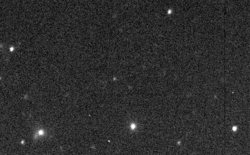Erriapus facts for kids

Discovery images of Erriapus taken by the CFHT in September 2000
|
|
| Discovery | |
|---|---|
| Discovered by | John J. Kavelaars et al. |
| Discovery date | in 2000 |
| Designations | |
| MPC designation | Saturn XXVIII |
| Pronunciation | /ɛriˈæpəs/ |
|
Named after
|
Erriap(p)us |
| S/2000 S 10 | |
| Orbital characteristics | |
| Epoch 2000 Feb. 26.00 | |
| 17 343 000 km | |
| Eccentricity | 0.4724 |
| 871.2 d (2.38 yr) |
|
| Inclination | 34.692 |
| Satellite of | Saturn |
| Physical characteristics | |
|
Mean diameter
|
10+50% −30% km |
| 28.15±0.25 h | |
| Albedo | 0.04 (assumed) |
|
Spectral type
|
light red B−V=0.83, R−V=0.49 |
Erriapus (pronounced err-ee-AP-us), also known as Saturn XXVIII (28), is one of the many moons orbiting the planet Saturn. It is an irregular satellite, which means it has a strange, non-circular orbit. Erriapus also has a prograde orbit, meaning it moves in the same direction as Saturn spins.
This moon was found in the year 2000 by a team of scientists including Brett Gladman and John J. Kavelaars. At first, it was given a temporary name: S/2000 S 10. Later, in 2003, it was officially named Erriapo. This name comes from Erriapus, a giant from Celtic mythology. The name was changed slightly to Erriapus in 2007 to follow naming rules.
How Big is Erriapus?
Erriapus is a small moon, about 10 kilometers (or 6 miles) wide. To give you an idea, that's roughly the size of a small city.
Erriapus's Journey Around Saturn
Erriapus travels around Saturn quite far away. Its average distance from Saturn is about 17.3 million kilometers (10.7 million miles). It takes Erriapus about 871 days, or roughly 2.4 Earth years, to complete one full trip around Saturn.
Part of the Gallic Group
Erriapus is a member of a family of moons called the Gallic group. These moons all share similar orbits and have a light red color. Scientists believe that all the moons in the Gallic group might have come from a single, larger moon that broke apart a long time ago. Erriapus could be a piece of that original moon, or perhaps a fragment of Albiorix, which is the largest moon in this group.
Erriapus spins quite slowly, taking about 28 hours to complete one full rotation. Its shape is also a bit stretched out. Because of this, scientists think Erriapus might be a "contact binary." This means it could be made of two smaller objects that are touching each other, or perhaps even two moons orbiting each other very closely.
See also
 In Spanish: Erriapo (satélite) para niños
In Spanish: Erriapo (satélite) para niños
 | Selma Burke |
 | Pauline Powell Burns |
 | Frederick J. Brown |
 | Robert Blackburn |

